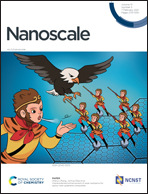Boron carbonitride with tunable B/N Lewis acid/base sites for enhanced electrocatalytic overall water splitting†
Abstract
In-depth research on energy storage and conversion is urgently needed; thus, water splitting has become a possible method to achieve sustainable energy utilization. However, traditional carbon material with high graphitization degree exhibits a relatively low electrocatalytic oxygen evolution reaction (OER) and hydrogen evolution reaction (HER) activity as it is electrochemically inert. In this work, according to the Lewis theory of acids and bases and the density functional theory (DFT) results, which show that the enriched heteroatom of B/N in the boron carbonitride (BCN) system may introduce stronger adsorption strength of OH*/H2O, respectively, we have designed and synthesized self-supporting BCN materials with different enrichment degrees of B/N (B-BCN/N-BCN) using carbon paper as substrate. Furthermore, by adjusting the contents of B and N, the optimum electrocatalytic performance of overall water splitting was obtained in which the onset voltage of water splitting on B-BCN//N-BCN was lower than 1.60 V. Our strategy of synthesizing materials with different heteroatom enrichment to improve the electronic environment of materials has opened up new opportunities for developing efficient metal-free electrocatalysts.



 Please wait while we load your content...
Please wait while we load your content...